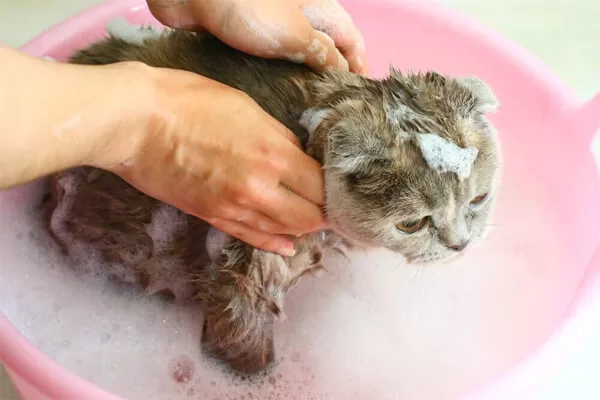Introduction to cat hygiene: 8 essential care
Did you know that hygiene is fundamental to your cat’s well-being? Taking proper care of your feline’s cleanliness and hygiene is essential to ensure its health and happiness. But how to do it correctly?
Keeping the hair clean, the ears free of dirt and preventing problems like tartar are some of the concerns when it comes to animal hygiene. It is important to remember that although cats are independent animals, they need our help in this regard.
In addition, territorial marking is also related to cat hygiene. Learning about these issues and seeking professional guidance can help you better care for your pet.
In this article, we’ll explore practical tips for maintaining your cat’s proper hygiene , from bathing to ear care. Let’s go!
The importance of hygiene for the well-being of the cat
Understanding how hygiene directly affects your cat’s well-being is key to ensuring a healthy and happy life for your pet feline. Maintaining a good cleaning routine is essential to provide the animal with quality of life, preventing health problems and ensuring its comfort.
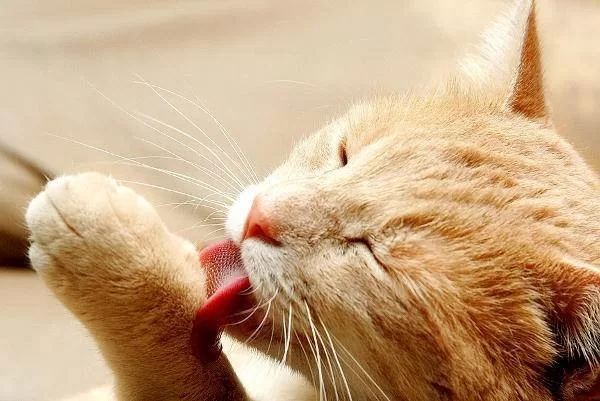
Benefits of maintaining a good cleaning routine
Proper hygiene brings several benefits to the cat. In addition to keeping its appearance always beautiful and fragrant, the regular practice of hygienic care helps to avoid diseases and discomforts that can affect the health of the animal. Among the main benefits are:
- Oral hygiene: Brushing your cat’s teeth regularly helps prevent the buildup of plaque, tartar and bad breath. Use animal-specific products and follow the vet’s guidance.
- Odor reduction: keeping the fur clean through regular brushing reduces the presence of loose hair around the house, in addition to reducing the characteristic odor of felines.
- Prevention of parasites: regular baths with suitable products help to eliminate fleas, ticks and other external parasites that can cause discomfort to the animal.
- Physical well-being: nail care, such as clipping or using scratching posts, prevents accidental injury to both the cat and the owners.
- Prevention of skin problems: keeping the fur clean and free of dirt prevents dermatological problems such as allergies and infections.
The lack of hygiene and its impacts on the health of cats
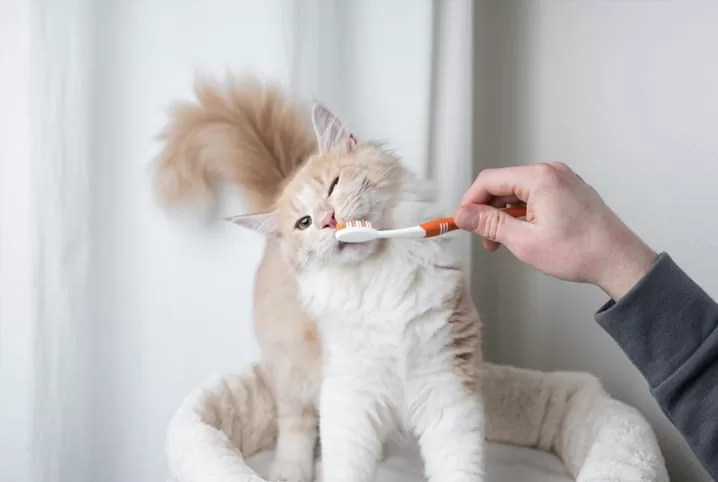
Despite the importance of hygiene for the well-being of cats, many tutors are unaware of the risks that lack of care can bring. Negligence with hygiene can lead to a series of health problems in cats, such as:
- Dental problems: without a proper tooth brushing routine, cats are more likely to develop periodontal disease, cavities and premature tooth loss.
- Respiratory diseases: when the environment in which the cat lives is not kept clean, there is a greater proliferation of mites and bacteria that can trigger respiratory diseases.
- Parasite infestations: the lack of regular bathing and grooming increases the chances of the animal being infested with fleas, ticks and intestinal worms.
- Stress
Tips for daily cat care
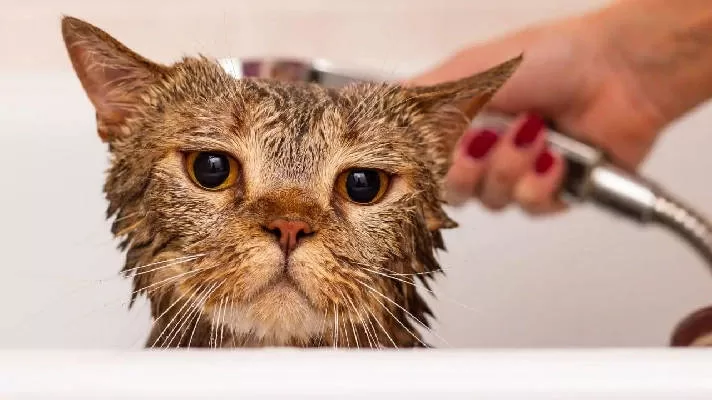
Discover the best practices for taking care of your cat’s daily hygiene .
Taking care of a cat’s hygiene is essential to ensure its well-being and health. In addition to providing moments of affection and connection between you, daily care also helps prevent future problems. Here are some important tips:
Brushing your cat’s coat correctly
Brushing your cat’s coat regularly is key to keeping its skin healthy, preventing matting and minimizing the amount of shedding around the house. To brush it properly, follow these tips:
- Choose the right type of brush: There are different types of brushes available on the market, such as those with soft bristles or rubber gloves with raised dots. Choose the one that best suits your cat’s coat type.
- Start slow: If your cat isn’t used to brushing, start slowly so he gets used to the feel of the brush on his skin.
- Brush in the direction of hair growth: This helps remove dead hair without causing your pet discomfort.
- Don’t Forget Target Areas: Pay special attention to areas prone to knotting, such as behind the ears and on the hind legs.
Useful tips for cleaning your cat’s ears, eyes and teeth
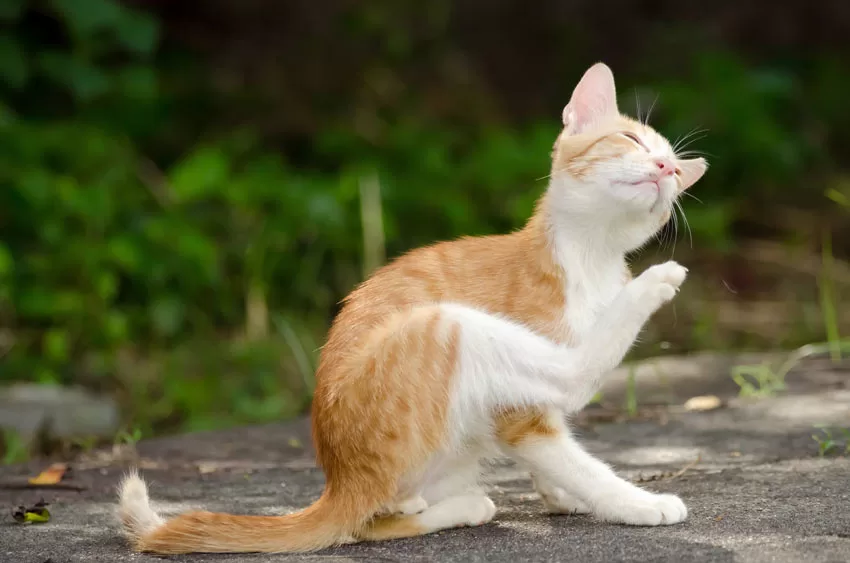
In addition to brushing, there are other parts of your cat’s body that also need daily care. Here are some tips for cleaning your cat’s ears, eyes and teeth:
- Ears: Use an ear-cleaning solution and a cotton pad or gauze to gently remove accumulated dirt from the ears. Avoid using cotton swabs as they can injure the ear canal.
- Eyes: Use a veterinarian-recommended ophthalmic solution to clean your cat’s eyes. Moisten a piece of cotton or gauze with the solution and gently remove any discharge or crust from the corners of your eyes.
- Teeth: Oral hygiene is essential to avoid dental problems and periodontal diseases. Brush your cat’s teeth daily with a pet-specific toothbrush and toothpaste. If he’s not used to it, start slowly, offering dental treats and gradually getting him used to brushing.
Always remember to observe your cat’s behavior during daily grooming.
How to choose the right grooming products for your cat
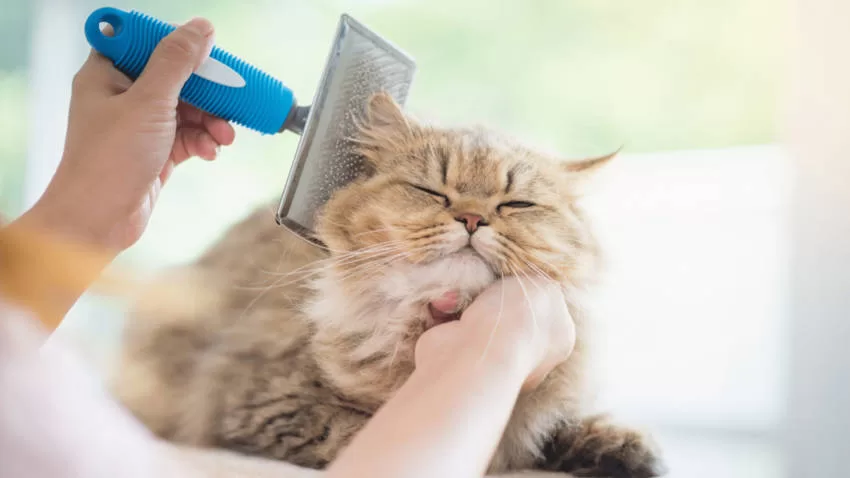
Grooming is an essential part of cat care, ensuring they are always clean and healthy. However, choosing the right products for your feline’s hygiene can be a challenge. In this article, we are going to discuss some important tips to help you select the best grooming products for your cat.
Learn how to select the right products for cleaning your cat’s fur and skin
When it comes to cleaning your cat’s coat and skin, there are a few key points to consider. First, make sure the product is specific for cats. Products developed especially for cats are formulated with the needs of their sensitive skin in mind.
Also, avoid products with harsh or irritating ingredients. Opt for ones that contain gentle, natural ingredients like colloidal oatmeal or chamomile. These ingredients help soothe your cat’s skin while deep cleaning.
Another important aspect is choosing the right type of product according to your cat’s coat type. For example, if your feline has long fur, you may need a shampoo specifically designed to remove knots and tangles. If he has short hair, a mild shampoo will suffice.
Find out which ingredients should be avoided in cat grooming products
When selecting hygiene products for your cat, it is essential to be aware of the ingredients present in the formula. Some components can be harmful to your feline’s health and should be avoided.
Avoid products that contain artificial fragrances, as they can irritate your cat’s sensitive skin. Likewise, avoid products with dyes or chemical preservatives, which can also cause allergic reactions.
Another ingredient to avoid is alcohol. Alcohol can dry out your cat’s skin and cause discomfort. Opt for products without alcohol or with a minimum amount of this component.
Find out what is the ideal frequency to bathe your cat and which shampoos to use
Bathing frequency for a cat can vary depending on several factors such as lifestyle, coat type and general health of the animal. In general, cats are very clean animals and regularly lick themselves to maintain personal hygiene. Therefore, they don’t need frequent baths like dogs do.
For most healthy cats , a monthly bath is sufficient.
Care of the cat’s litter box and nails
Maintaining proper litter box hygiene and taking care of your cat’s nails are essential aspects of ensuring your feline’s well-being and health . In this article, we’ll share important tips on how to keep your cat’s litter box clean and attractive, as well as guidelines on how to cut your cat’s nails safely and efficiently.
Keeping a litter box clean
Litter box hygiene is key to preventing behavioral problems and ensuring your cat’s comfort. Here are some important tips:
- Choose the right place: Position the box in a quiet, accessible place and away from the area where he eats or drinks water.
- Use a large box: Make sure the box is big enough for the cat to move around comfortably.
- Daily cleaning: Remove solid waste every day, using a shovel suitable for this purpose. This prevents the odor from spreading around the house and keeps the box more attractive to the feline.
- Complete change regularly: Every two weeks, make a complete change of the sand used for a new one, washing the tray well before that.
- Choose a suitable sand: There are different types of sand available on the market, such as silica, sanitary or natural granules. Try different options until you find the one that is most acceptable to your cat.
Caring for your cat’s nails
Keeping your cat’s nails trimmed is important to prevent unwanted scratching on furniture and people. Here are some guidelines on how to cut your cat’s nails safely:
- Choose the right time: Wait for the cat to be calm and relaxed before clipping the nails. Avoid doing this when he is agitated or scared.
- Use a suitable clipper: Purchase a cat-specific nail clipper that is sharp and of good quality.
- Approach with care: Gently grasp the cat’s paw and lightly press the paw pad to expose the nails.
- Cut only the tip: Cut only the white tip of the nail, avoiding reaching the pink part known as the “vein”. If in doubt, consult a veterinarian or specialized professional.
Common grooming problems in cats and their solutions
Cats are animals known for their meticulous grooming, spending much of their time grooming themselves to keep their fur clean and healthy. However, even with all this care, they may still face hygiene-related issues. In this article, we will cover the most common problems that cats can face in this area and their solutions.
Flea and tick infestations
Fleas and ticks are external parasites that can cause great discomfort to cats. They feed on the blood of felines and can transmit serious diseases. Therefore, it is important to be aware of signs of infestation with these parasites, such as excessive itching, hair loss and skin irritation.
To treat flea and tick infestations in cats, there are several options available:
- Antiparasitic medications: There are specific medications for cats that help eliminate fleas and ticks present on the animal. These medications are usually available in pill or spot-on form (pipettes applied to the skin).
- Anti-flea baths: Some special shampoos have repellent or insecticidal properties that help fight these parasites during the cat’s bath.
- Cleaning the environment: To avoid reinfestations, it is essential to clean the environment where the cat lives. Wash his bedding regularly, vacuum carpets and furniture, and use specific products to eliminate fleas and ticks from the environment.
Dermatological problems in cats
Dermatological problems are quite common in cats and can be caused by several factors, such as allergies, fungal or bacterial infections, among others. These problems can manifest themselves through intense itching, redness of the skin, wounds or excessive hair loss.
To prevent and treat dermatological problems in cats, consider the following solutions:
- Adequate food: A balanced diet rich in nutrients is essential to maintain the health of the skin and coat of cats. Consult a veterinarian for guidance on the best food for your feline.
- Regular Grooming: Brush your cat’s coat regularly to remove loose hair and stimulate blood circulation in the skin. This helps prevent dirt buildup and reduces the risk of infections.
- Specific treatment: In cases of more serious dermatological problems, it is important to seek appropriate veterinary treatment.
The importance of regular visits to the veterinarian for the health and hygiene of the cat
Taking your cat to the vet regularly is essential to ensure its health and hygiene. In this article, we’ll discuss why these visits are so important and what tests should be performed during veterinary appointments. Plus, we’ll give you tips on proper vaccinations and deworming to keep your cat healthy .
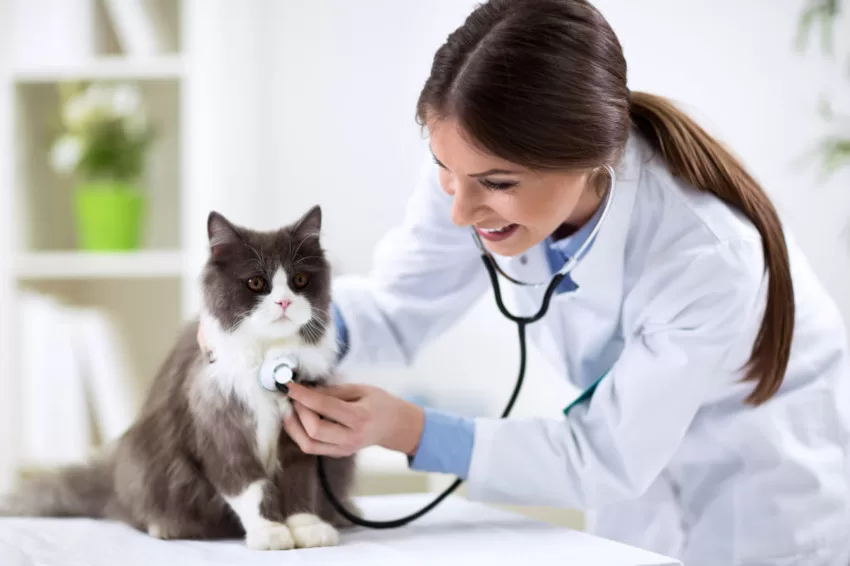
Taking care of your cat’s health
Regular vet visits are essential to boost your pet’s health. During these check-ups, the veterinarian can identify potential health problems early and take the necessary steps to treat them. In addition, he will be able to advise on specific care for the hygiene of your animal.
During appointments, some tests are essential to ensure good hygiene for your cat. The veterinarian will perform a complete physical exam, checking the animal’s eyes, ears, mouth and teeth. This evaluation is important not only to identify dental problems or ear infections, but also to prevent serious illnesses.
Another important point is the proper vaccination of your cat. Vaccines protect against several viral diseases that can seriously compromise the health of pets. The vaccination schedule must be strictly followed and updated annually. The veterinarian will advise on which vaccines are needed according to the animal’s age and lifestyle.
Vermifugation is another fundamental aspect for the health and hygiene of the cat. Worms can cause a variety of problems, including diarrhea, weight loss, and anemia. Thus, the veterinarian will indicate the best vermifuge for your animal and advise on the appropriate frequency of treatment.
In addition, during veterinary consultations, it is important to discuss specific dietary habits and care according to the cat’s breed . Some breeds have special grooming needs, such as regular grooming or eye cleaning.
In short:
Finally, we cannot forget the importance of sterilizing or neutering the cat. In addition to avoiding unwanted reproduction, this surgery brings benefits to the animal’s health, preventing diseases such as mammary tumors and uterine infections.
In short, regular visits to the vet are essential to ensure your cat’s health and hygiene. During these check-ups, important tests will be carried out to identify possible health problems early.
Conclusion: ensure a healthy and hygienic life for your cat
Taking care of your cat’s hygiene is essential to ensure its health and well-being. By adopting proper hygiene practices, you will be providing a clean and safe environment for your feline. Here are some important tips to keep in mind:
The importance of hygiene for the well-being of the cat
Hygiene plays a key role in the lives of cats. Keeping the coat clean, nails trimmed and the litter box in good condition are essential aspects to avoid health problems and ensure that your cat feels comfortable in your home.
Tips for daily cat care
In addition to regularly brushing your cat’s coat, it’s important to also check its ears, eyes and teeth. In addition, cleaning your ears with specific products, observing possible signs of eye infection and brushing your teeth regularly help prevent future problems.
How to choose the right grooming products for your cat
When choosing grooming products for your cat, consider their age, breed and individual needs. Opt for cat-specific products, such as mild shampoos and brushes suitable for your pet’s hair type.
Care of the cat’s litter box and nails
Always keep the litter box clean, as felines are extremely demanding animals in terms of hygiene. Also, regularly trim your cat’s nails to prevent them from growing excessively and causing discomfort.
Common grooming problems in cats and their solutions
Some hygiene problems can arise in cats, such as fleas, ticks and hairballs. In summary, look for suitable solutions for each of these problems, such as anti-flea products recommended by the veterinarian and special brushes to minimize the formation of hairballs.
The importance of regular visits to the veterinarian for the health and hygiene of the cat
Schedule periodic vet appointments to ensure your cat is always healthy. The professional will be able to advise on the specific hygiene care needed for your feline, in addition to identifying possible problems early.
Don’t leave your cat’s hygiene in the background. By adopting proper practices and following the tips mentioned above, you will be providing a healthier and more comfortable life for your feline companion.
Frequently Asked Questions (FAQs)
How can I prevent my cat from getting fleas?
Keeping the environment clean is key to preventing flea infestations. Use vet-recommended flea products, such as collars or topical medications. Also, regularly vacuuming the house and washing your cat’s bedding will help control these parasites.
What is the best way to cut my cat’s nails?
So trimming your cat’s nails can be a challenging task. Use a cat-specific nail clipper and be careful not to cut too close to the pink part of the nail, where the blood vessels are. If necessary, ask for help from a professional.
How to choose the right shampoo for my cat?
When choosing a shampoo for your cat, opt for gentle, feline-specific products.
External References:

